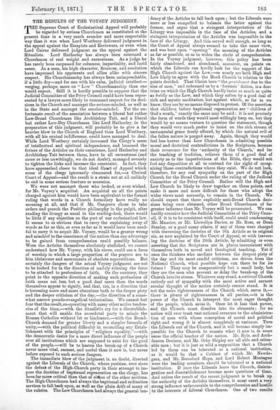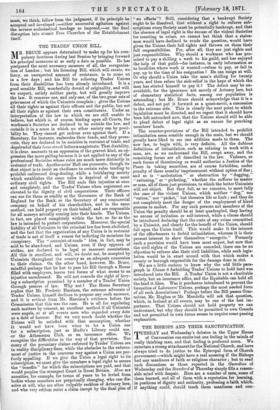THE RESULTS OF THE VOYSEY JUDGMENT. T HE Supreme Court of
Ecclesiastical Appeal will probably be regarded by serious Churchmen as constituted at the present time in a very much sounder and more respectable way than it was when Lord Westbury delivered judgment in the appeal against the Essayists and Reviewers, or even when Lord Cairns delivered judgment on the appeal against the Ritualists. Lord Hatherley has always - been esteemed a Churchman of real weight and earnestness. As a judge he has rarely been surpassed for calmness, impartiality, and lucid sense. As a man, his high character, firmness, and resolution have impressed his opponents and allies alike with sincere respect. His Churchmanshp has always been unimpeachable, if a little dry—and for one with his calm, judicial intellect— verging, perhaps, more on " Low " Churchmanship than one would expect. Still it is hardly possible to suppose that the Judicial Committee of the Privy Council could have been repre- sented by a lawyer more likely to command respect for its deci- sions in the Church and amongst the serious-minded, as well as in the State and amongst the secular-minded. Yet the un- fortunate result of the association between a liberal but rather Low-Broad Churchman like Archbishop Tait, and a liberal but rather Low-Dry Churchman like Lord Hatherley, in the preparation of this judgment, will probably be to give a far heavier blow to the Church of England than Lord Westbury, with all his cynical indifference, could have managed to deal. While Lord Westbury certainly increased the Clergy's sense of intellectual and spiritual independence, and loosened the fetters of the Articles on their conscience, Lord Hatherley and Archbishop Tait between them, have in all earnestness (and more or less unwittingly, we do not doubt), managed severely to tighten the links and increase the constraint. In fact, they have approached closer to that ideal Court of Appeal which some of the clergy ignorantly clamoured for,—a Clerical Court of Appeal—and the result is a strain not at all unlikely to end in some serious fracture or secession.
We were not amongst those who looked, or even wished, for Mr. Voysey's acquittal. An acquittal on all the points charged against him would have been equivalent to the formal ruling that words in a Church formulary have really no meaning at all, and that if Mr. Congreve chose to take orders and preach the Positive philosophy in the pulpit, after reading the liturgy as usual in the reading-desk, there would be little if any objection on the part of our ecclesiastical law. It seems to us obvious that to carry the explaining away of words as far as this, or even as far as it would have been need- ful to carry it to acquit Mr. Voysey, would be a greater wrong and mischief to the conscience of the nation than any advantage to be gained from comprehension could possibly balance. Were the Articles themselves absolutely abolished, we cannot understand how Mr. Voysey, with his views, could use a form of worship in which a large proportion of the prayers are to him idolatrous and monuments of obsolete superstitions. But certainly the dangers of the actual Voysey judgment are not to be looked for in the direction of unduly relaxing the force to be attached to professions of faith. On the contrary, they point in the opposite direction of making such professions of faith mean not less, but a good deal more than the words themselves appear to signify, and that, too, in a direction that is becoming more and more obnoxious both to the deeper piety and the deeper criticism of the day,—the direction of a some- what narrow pseudo-evangelical technicalism. We cannot but fear that the result, co-operating with many other active tenden- cies of the time,—with the ritualistic cry for a disestablish- ment that will enable the sacerdotal party to mimic the Roman Catholics without let or hindrance,—with the Broad- Church demand for greater liberty and a simpler formula of unity,—with the political difficulty in reconciling any Estab- lishment with the principles of " religious equality,"—with the democratic desire for a more direct influence of the people over all institutions which are supposed to exist for the good of the people,—will be to hasten the break-up of a Church never more vital, earnest, and useful than it now is, but never before exposed to such serious dangers. The immediate blow of the judgment is, no doubt, directed against the Liberals of the Church, whose position, ever since the defeat of the High-Church party in their attempt to im- pose the doctrine of baptismal regeneration on the clergy, has been far more critical than that of eitsher of the other sections. The High Churchmen had always the baptismal and ordination services to fall back upon, as *ell as the plain drift of many of the rubrics. The Low Churchmen had always the general ten- deney of the Articles to fall back upon ; but the Liberals were more or leas compelled to balance the latter against the former, and argue that a stringent interpretation of the Liturgy was impossible in the face of the Articles, and a stringent interpretation of the Articles was impossible in the face of the Liturgy. And this served well enough, so long as the Court of Appeal always seemed to take the same view, and was bent upon " opening " the meaning of the Articles as far as possible, so as to widen the circle of comprehension. In the Voysey judgment, however, this policy has been fairly abandoned, and abandoned, moreover, on points on which the Liberals can hardly look for the support of the High Church against the Low,—so nearly are both High and Low likely to agree with the Hard Church in relation to the points decided. That Christ bore " the punishment due to the sins of men," and redeemed us by a forensic' fiction, is a doc- trine on which the High Church hardly insist so much or quite BO baldly as the Low, and which they soften by a good deal of rich and mystic meditation, but against which, as far as we know, they are by no means disposed to protest. Of the assertion that children before baptismal regeneration are " children of God's wrath," exactly the same may be said ; it is not precisely the form of words they would most willingly harp on, but they would by no means venture to question the statement, though they would very much prefer to insist on the rich stream of sacramental grace freely offered, by which the natural evil of the fallen nature is purged away. Again, though they would feel less horror than Low Churchmen in admitting possible moral and doctrinal contradictions in the Scriptures, because their reverence for the authority of the Church,' and for the teaching of tradition, relieves them of a good deal of anxiety as to the imperfections of the Bible, they would not feel any disposition at all to contend for the right of recog- nizing those contradictions where they exist. We do not look, therefore, for any real sympathy on the part of the High Church for the Broad Church under the ruling of the Judicial Committee of the Privy Council. Rather will the High and Low Church be likely to draw together on these points, and make it more and more difficult for those who adopt the wider views most earnestly, to remain in the Church. We should expect that these explicitly anti-Broad Church deci- sions being once obtained, other Broad Churchmen of far greater influence than Mr. Voysey will be prosecuted. We can hardly conceive how the Judicial Committee of the Privy Coun- cil, if it is to be consistent with itself, could avoid condemning Mr. Maurice, or Mr. Llewellyn Davies, or Mr. Ross, or Dean Stanley, or a good many others, if any of them were charged with traversing the doctrine of the 9th Article as to original sin, as now explained by the Court of Appeal, or with travers- ing the doctrine of the 20th Article, by admitting or even asserting that the Scriptures are in places inconsistent with themselves both in moral and theological teaching. Yet if once the thinkers who mediate between the deepest piety of the day and its most candid criticism, are driven from the National Church, what possible hope can there be for its future ? They may be comparatively but a small body, but they are the men who prevent or delay the break-up of the Church into its atoms. Whatever may stand, a national Church entirely out of sympathy with the most active and earnest secular thought of the nation certainly cannot stand. It is not the mere righteousness of the Church which saves %— there is plenty of righteousness in all parties,—it is the power of the Church to interpret the most eager thought of the people, which saves it. Once let it lose that power, and the Church must dissolve into its elements ; for no nation will ever trust vast national revenues to the administra- tion of men with whose conception of moral and political right and wrong it is almost completely at variance. Turn the Liberals out of the Church, and it will become simply im- possible for the Church to remain what it now is, in some sense the official teacher of the nation. Mr. Ryle, and Arch- deacon Denison, and Mr. Orby Shipley are all able and estim- able men ; but it is just as wild a supposition that. a Church led by them can be tolerated as a national institution, as it would be that a Cabinet of which Mr. Newde- gate, and Mr. Beresford Hope, and Lord Robert Montague were the leading members, should be tolerated as a national institution. If once the Liberals leave the Church, disinte- gration and disestablishment become mere questions of time. And unless the result of the recent judgment is to break up the authority of the Articles themselves, it must exert a very strong influence unfavourable to the comprehension and hostile to the interests of Liberal Churchmen. One of two results
must, we think, follow from the judgment, if its principle be accepted and developed ;—either successful agitation against the severer ecclesiastical bondage so imposed,—or the final disruption into atomic Free Churches of the Establishment itself.



































 Previous page
Previous page